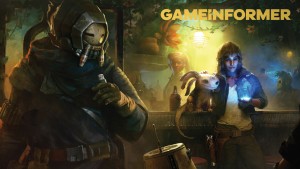Please support Game Informer. Print magazine subscriptions are less than $2 per issue
Game Changer: What Society Can Learn From The Economics Of Video Games

Video games are often used as a learning tool, but most educational games focus on word memorization or the magic of math. However, many game theorists and economists are beginning to realize that video games have something more significant to teach us about the function of our societies, governments, and economies. In 2001, economist Edward Castranova wrote a groundbreaking paper about the economy of EverQuest. In his paper, Castranova revealed that EverQuest’s currency was more valuable than the Japanese Yen, and that the game’s gross national product was actually bigger than that of China or India. Castranova is now a telecommunications professor at Indiana University Bloomington and is currently working on a book about evolutionary game theory and how virtual economies are drastically influencing our own.
 What drew you to studying game economies?
What drew you to studying game economies?
I started playing EverQuest in 1999, and I saw all this market activity going on in the game. I thought, “wouldn’t it be funny if I wrote a joke paper about the funky economies inside this word.” It was honestly going to be a joke. There was another paper, at the time, where someone had done a careful analysis of the incentives in the game show Jeopardy. It used very formal language, and that’s what made it funny. I started doing that with EverQuest, but then I started to get real data, and I realized that this game’s economy was actually pretty big, really productive, and held genuine economic value.
So how can games provide insight into real life problems and politics?
The two groups don’t really realize this yet, but game designers and policy makers are doing exactly the same thing. Both groups have these giant populations that are so big that you can’t sit down and talk to everyone about exactly what they want, so you get this mass of information and opinions. And your job is to look out at this sea of people and figure out what would make them happier and then design a bunch of rules that does that. How do you handle player vs. player combat? How do you handle the market? How do you handle conflict between players? Those are all political problems. Many game designers function like lawyers or policy makers. The policies may be very different, but they are in the same business.
Do you think there are opportunities for each side to learn from the other?
I think that the opportunities go in one direction. I think that game designers should not take anything from the policy makers, because policymaking is so bad. Think about this, we’re going to implement a change to health policy that is going to involve one sixth of our economy. No game designer would ever do something like that without testing it, but we go forward without tests all the time in real life. I think that real world governments have a lot to learn from the way that game designers develop patches, how they talk about that process, how they implement it, and how they do the actual work to figure out what that patch will be.
What about the economic world? How can big business use games to improve their business?
Well, you’re stepping over that live wire called Gamification, and I don’t want to give anyone the idea that Gameification is a reasonable strategy for businesses. The basic idea is that you have all these people doing data entry, and if you just give them badges every time they do something, then magically they’ll love their job. That’s not how human behavior works. I think that we can do a much better job of making the lives of everybody in the real world feel more meaningful, but that’s not Gamification, that’s a cultural change. Figuring out how to do that is the tough problem, but giving everyone badges is a weak attempt to make your company a more enjoyable place. What’s going on here is basic human motivation. The gaming industry knows more about engaging people than any other industry right now.
Where do we go from here? How will digital economies continue to affect our world as we move forward?
I’m actually working on a book called Wild Cat Currency. Wild Cating was a term used to describe how the oil barons of Oklahoma and Texas would go out into the open land and drill holes to find black gold. They were throwing oil derricks everywhere and it was completely unregulated. Towns would grow up out of nowhere and disappear a week later. Well, that’s kind of what we’re seeing with virtual currencies. Anyone who has a social media application or virtual world or MMO has a little currency in their system, but some of these applications get to a scale that they can be traded against the dollar. Facebook has 800 million people, and they have a thing called a Facebook credits. What happens if that becomes something that people are using, through Facebook, to buy and sell stuff? All of a sudden, if I’m the Federal Reserve Board I’m going to take notice. America only has 300 million people, but Facebook has 800 million and they have this other currency! It starts to become this parallel economy. Is that legal? And even if it’s legal, is it dangerous to our economy? What should we do about it? That’s why I’m working on now. This kind of stuff is going to profoundly effect our future.










